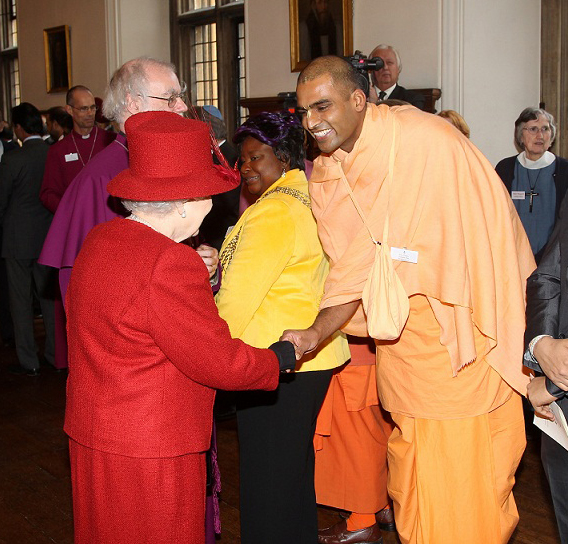Last week I had the good fortune of meeting Her Majesty The Queen and His Grace the Archbishop of Canterbury. A multi-faith reception was held at Lambeth Palace; one of the first public engagements to celebrate the Queen’s Diamond Jubilee year. The event was attended by representatives from the Christian, Baha'i, Buddhist, Hindu, Jain, Jewish, Muslim, Sikh, and Zoroastrian communities. It was an opportunity to pay tribute to the spiritual contribution of all religions in the UK, and to show continued support for the free practice of faith in the country.
The Queen expressed how spiritual traditions provide critical guidance for the way we live our lives, and for the way in which we treat each other. She wonderfully underlined how the lives of great teachers remind us of the responsibilities we have beyond ourselves. As I spoke to the leaders of various denominations, our discussions revolved around making spirituality applicable and dynamic in the modern context. In an age of growing secularism, there are doubts about the necessity of spirituality as an integral part of a vibrant society. It is sometimes seen as sentimental and unscientific, and on a social level often divisive and provocative. Others argue that ancient teachings are outdated and irrelevant, and function simply to give people a sense of identity and social belonging.
Amidst this tide of skepticism, spiritual practitioners have an incredible responsibility to share their teachings with greater acumen and astuteness. Through rationality, logic and common sense, they have to reveal the synthesis between science and spirituality, and firmly establish that metaphysical phenomena can be grounded in reason and argument. Through cooperation, appreciation and loving relationships, they have to demonstrate that genuine spirituality builds bridges, serves society in times of need, and promotes peace and unity. Through sagacity and dialogue, ancient traditions must offer cutting edge spiritual solutions to the problems of the modern world – solutions which are universally applicable, long lasting and free from detrimental side effects. Most essential, is to educate and inspire people to recognize that spirituality is more than a Sunday ritual, but rather an offer of worldviews, values, and spiritual practices which drive our daily functioning and journey within this world.
I walked away from Lambeth Palace with a greater sense of purpose. We definitely have our work cut out.


 Tuesday, February 28, 2012
Tuesday, February 28, 2012
 Sutapa das
Sutapa das



